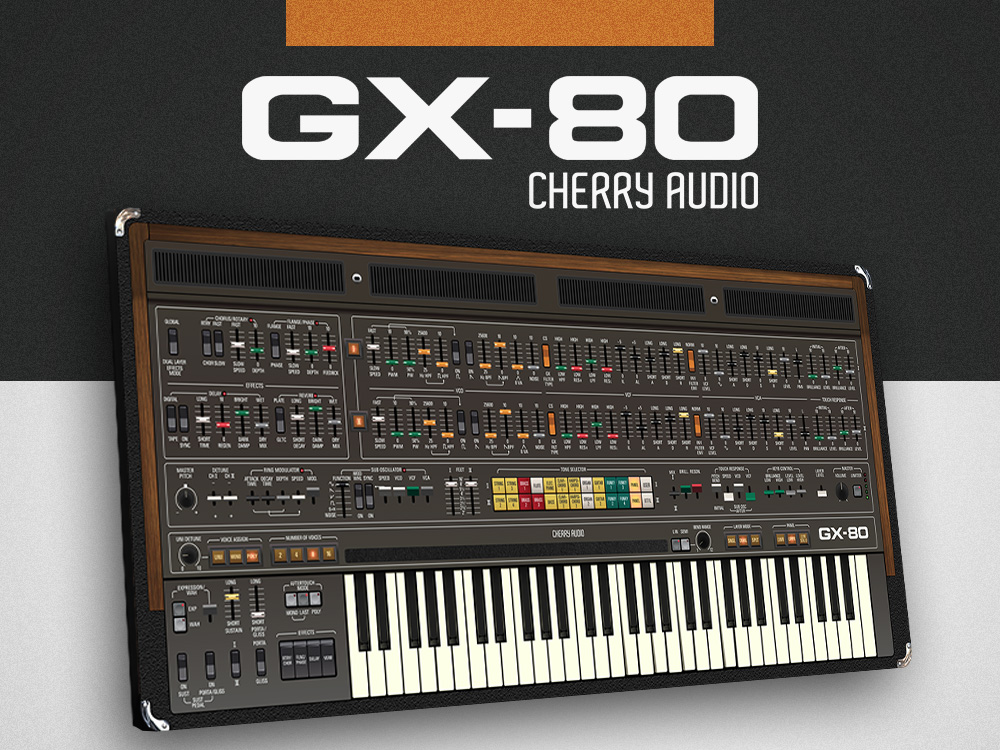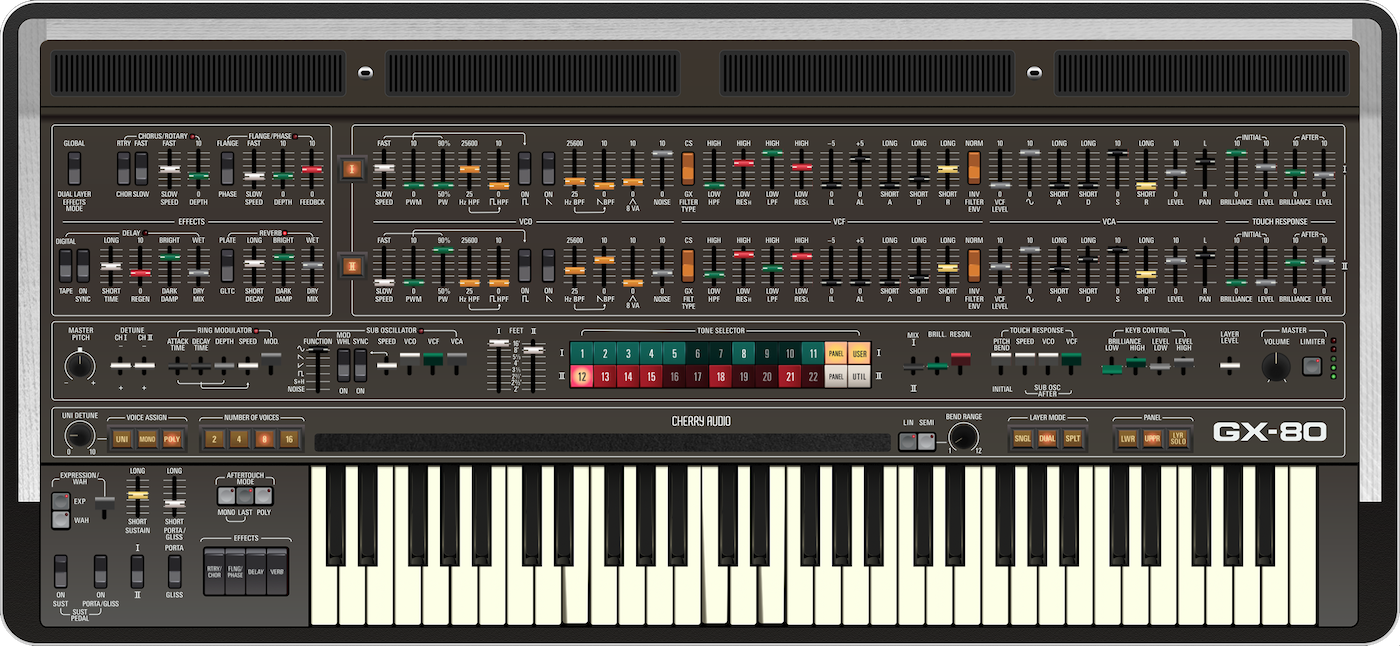- hot!
- sale
- top rated
The Dream Machine
The Flagship
GX-80 is Cherry Audio's visionary flagship synthesizer, over a year in the making. Combining the unparalleled sound and features of the fabled GX-1 "Dream Machine" and its renowned descendant, the CS-80, GX-80 is a transformative virtual synthesizer blending the essence of two groundbreaking instruments to create a powerhouse hybrid. Featuring the carefully crafted and intensely circuit-modeled DSP designs of award-winning developer Mark Barton, Cherry Audio has replicated every subtlety of the classics to create the most authentic emulation of its kind.
More than a Replicant
GX-80 is not just another CS-80 emulation. GX-80 adeptly reintegrates the GX-1's distinctive features back into the CS-80 architecture, such as dual synth layers for twice the impact and additional waveforms with variable resonators. The GX-1's octave-up triangle wave and invert filter envelope control have been reincorporated. Most notably, GX-80 includes an expert reproduction of the legendary GX-1 filter that delivers exquisite timbres that even the mighty CS-80 cannot produce.
For ultimate flexibility and expressive performance, GX-80 provides a split keyboard mode and a brilliant option to simulate polyphonic aftertouch with a monophonic aftertouch controller. With its innovative dual-layer interface, stunning sound presets, and integrated studio-quality effects, GX-80 is more than a best-of-both-worlds interpretation of the past and far more than a replicant. Cherry Audio's GX-80 is an unprecedented gateway to the sounds and music of an unrealized future.
Unobtainium, Until Now
At last count, only a dozen operating GX-1s have been accounted for, and used CS-80s are rarely listed for less than $60,000. The rarity and exorbitant cost of both instruments has made it impossible for musicians to experience these legendary instruments. That's why Cherry Audio is making its flagship GX-80 synthesizer available at an astounding low price that anyone can afford.
More than the Sum of its Parts
A virtual reproduction of the CS-80 has long been the most popular request from Cherry Audio users. The company began work in 2021 to make the dream a reality. DSP designer and developer Mark Barton's extensive research of the original CS-80 and its schematics led him back to the CS-80's predecessor. It was determined that this synth would not simply be another CS-80 emulation: it would also reincorporate the extra features of the mighty GX-1.
The GX-80 emulates all of the sonic and control characteristics of the originals with unprecedented accuracy. The Cherry Audio team has measured and replicated every subtlety of the classics to create the most authentic emulation of its kind. As a result, GX-80 can produce thicker timbres that more closely match that of the originals. GX-80 models the filter, envelope behavior, portamento and glide, pitch ribbon, and PWM more accurately than any previous emulation.
Single layer mode allows GX-80 to operate like the standard two-rank CS-80, and the GX-1's two voice ranks are added when the layer mode is set to dual. The GX-1's additional filtered waveform outputs are included, as well as its octave-up triangle wave, invert filter envelope control, and the acclaimed filter topology. All GX-1 parameter sliders and switches are orange to distinguish them from standard CS-80 control parameters.
To provide a performance experience as close as possible to the original hardware, GX-80 includes a split keyboard mode and support for both polyphonic and monophonic aftertouch controllers, with a unique "last-note priority" mode for simulated poly aftertouch response. With its dual-layer interface, 1,000 stunning sound presets, and integrated studio-quality effects, GX-80 is a singular effort worthy of the "flagship" label.
Features
- A best-in-class virtual instrument based on two monumental analog classics: the GX-1 and CS-80
- Reintegrates the extended features of the GX-1 with all of the functionality of its descendant, the CS-80, for an absolutely immense sound experience; essentially, two CS-80s and more!
- Massive dual-layer voicing architecture with 16 polyphonic voices per layer: two different patches simultaneously playable, in either a keyboard split or stacked layer mode, with discrete controls for layer volume and panning
- All GX-1 and CS-80 voicing parameters reproduced, including the GX-1's unique oscillator-level filtered waveforms, octave-up triangle wave, and invert filter envelope control
- Precision recreation of both the legendary CS-80 and unmatched GX-1 filters
- Four polyphonic voice ranks, each with a voltage-controller oscillator, resonant highpass and lowpass filters, noise generator, sine wave, dual envelope generators, and a velocity-sensitive VCA
- Sub oscillator LFO for each layer with sine, sawtooth, ramp, square, sample and hold, and noise intended for modulation, with tempo sync
- Recreation of the memorable CS ring modulator that modulates the summed output of each pair of ranks with its own independent oscillator
System Requirements
Mac
- 10.13 or above.
- macOS 13 Ventura supported.
- 64-bit required.
- Native Apple M1 processor support, including Apple M1 Ultra.
- 3.4 GHz Quad-Core or M1 CPU with 8GB of RAM recommended.
- Available in AU, VST, VST3, AAX & Standalone formats
Windows
- Windows 7 or above (including Windows 11), 64-bit required.
- Quad-core computer with 8GB of RAM recommended.
- Available in VST, VST3, AAX & Standalone formats
Any references to any brands on this site/page, including reference to brands and instruments, are provided for description purposes only. For example references to instrument brands are provided to describe the sound of the instrument and/or the instrument used in the sample. Plugin Boutique do not have (nor do they claim) any association with or endorsement by these brands. Any goodwill attached to those brands rest with the brand owner. Plugin Boutique or its Suppliers do not accept any liability in relation to the content of the product or the accuracy of the description. "RHODES" is a registered trademark of Joseph A Brandstetter.

